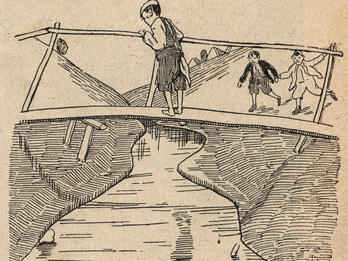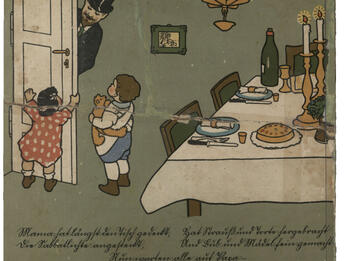The Hermit
[Vocabulary list in (from right to left) Hebrew, Yiddish, and Russian, with notes in French and English]
| Cavern | Antre | Пещера | האֶהלע | מעְרָָה |
| To miss (the aim) | Manquer | Не пѳпадать въ цвль | ,פערפעהלען פעהל שיעסען | החַטֲֵא |
| To cover (roof) | Couvrir (d’un toit) | Крыть, скрывать | ,בּעדעקען בּעדאַכען | ספָןֹ |
| Wax | Cire | Воскъ | וואַכּס | דּוֹנַג |
| Retire, abstain | Se retirer, abstenir | Отрекатьея, воздерживатьея | זיך ,צוריקציעהען ענטזאַגען | ,הִנּזָרֵ הִזּוֹר (זור) |
| Solitary | Solitaire | Отшельниъ | איינזיעדלער | מתְִבּוֹדֵד |
In ancient times there were also hermits [mitbodedim] in Israel. The hermit was a man who left his city and his house, abstained from all the pleasures of the world, and dwelled alone in forests or caverns. One day a righteous and wise man came into the forest who looked, and behold, among the thickets of the trees stood a small shack, built of tree branches and covered with moss and bark. This was the hermit’s dwelling place. The traveler came to the shack to rest a bit. And the hermit, an old man, greeted him in a friendly manner, inviting him to sit. A conversation quickly started up between them. The hermit told him about his quiet and peaceful life, and the guest told him of the happenings of people in the world, and how they wrought great things through their labor.
In the end, the guest said, “But tell me, please, old man, why did you seclude yourself in the forest and abstain from the world?”
“In order that I might serve the Lord in quiet and rest,” the elder man answered.
“But do you know what it means to serve God?” asked the guest.
“To serve God,” answered the hermit, “does it not consist of praying to Him every day, and turning away from evil?”
“If that is what you think, you have erred greatly,” answered the righteous wise man. “Prayer and avoiding evil are only a small portion of serving God. True service to God consists in helping our brethren, our fellow human beings, to labor with them and to act for their benefit. All human beings from the rising of the sun in the east to its setting in the west are one great family. They are the children of one father, children of God. And our Heavenly Father desires the happiness of the family. He desires that it shall be well with His children. Therefore, it falls upon every person to help make this great family prosper, to labor and to act, and it is forbidden for anyone to absent himself from his brethren, to be solitary, and act only for himself. However, you have retired from the family and are of no use to anyone, and so you have missed your goal.”
But the hermit refused to concede to the words of the guest. And he attempted to justify and to praise the life of solitude. And behold, a bee flew into the shack, and it rested on one of the branches in the wall.
“This bee comes to prove the error of your ways,” said the guest.
“And how?” asked the hermit.
“You know,” answered the guest, “that the bee is a very useful creature. However, if you propose to confine this bee sitting on the wall to your shack, and to keep her with you, then she will be of no use at all to you. Only by working together with thousands of her species can she give us the honey that gladdens our hearts, and the wax that is good for all of us.”
Then the solitary man saw his error. “You are right, good sir,” he said to the guest; “were I not so old, I would now return today to my brethren, to my fellow human beings, and work with them all for the good of all.”
Translated by
.
Credits
Israel Ḥayim Taviov, “Ha-mitboded” [The Hermit], ‘Eden ha-yeladim: Sefer mikra li-yeladim ve-li-yeladot, vol. 2 (Warsaw: Tushiyah, 1901), pp. 432–34.
Published in: The Posen Library of Jewish Culture and Civilization, vol. 7.




